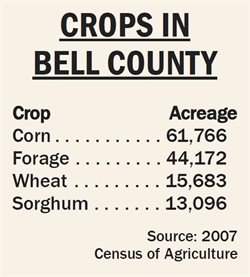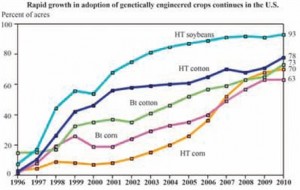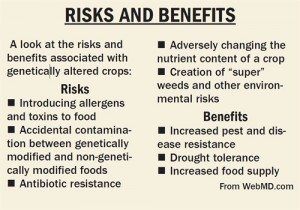Genetic crops now widely accepted
July 2010
By Carroll Wilson- Published July 7, 2010
TELEGRAM MANAGING EDITOR
Almost all the cotton and corn produced in the United States is genetically engineered, according to a report just released by the U.S. Department of Agriculture.
In Texas, 90 percent of both crops fall in that category.
And it’s likely the same in the Bell County or Central Texas area, said Dr. Thomas J. Gerik, resident director of the Texas AgriLife Research, Blacklands Research and Extension Center in Temple.

The USDA statistics show that genetically engineered crops have been widely adopted “notwithstanding uncertainty about consumer acceptance and economic and environmental impacts.”
About 46 percent of the cotton planted in Texas in 2000 was modified. By this year, the amount had soared to 91 percent.
The latest data for corn shows that in 2005, about 72 percent of Texas acreage was modified. Today, the acreage is 85 percent.
Last year, Texas farmers planted 2.35 million acres of corn and harvested about 2.1 million acres, with a yield of about 130 bushels per acre.
In 2008, they planted about 250,000 fewer acres and harvested about as much as was planted at a value of $1.2 billion. USDA records show that production per acre has increased substantially since 1996.
In general, the large companies that sell seed to U.S. farmers have genetically altered the seed to be pest resistant and herbicide resistant, Gerik said.
Farmers use genetically modified seed “largely because it’s cost-effective to do that,” Gerik said. “It saves them time and money.”
And in the case of corn, it keeps them from having a crop infected with a toxic cancer- causing agent called aflotoxin, he said.
Bottom line is the bottom line: higher yields, more food for U.S. families and low to stable prices.
Gerik said he’s familiar with arguments against the use of genetically modified seed, particularly economic arguments about the growth of a handful of giant corporations that can provide the seed and what that might ultimately mean to pricing and availability.
“I can’t say if it’s good or bad,” he said. “Without consolidation of these companies you don’t have the resources necessary to do the research. On the other hand, there are limitations to development of these technologies.”

Data for each crop category include varieties with both HT and Bt (stacked) straits. Sources: 1996-1999 data are from Fernandez-Cornejo and McBride (2002). Data for 2000-10 are available in the ERS data product, Adoption of Genetically Engineered Crops in the U.S., tables 1-3

In 2010, the large agri-business companies are set to release a corn seed that is drought-tolerant, Gerik said. The companies say the seed will increase yields by 15 percent.
“Then, a few years later another set of genes will extend that drought protection longer, and increase yields by 30 percent,” he said.
“All projections show increased demand for corn and cereal grains,” he said.
–Reprinted with permission of Temple Daily Telegram
